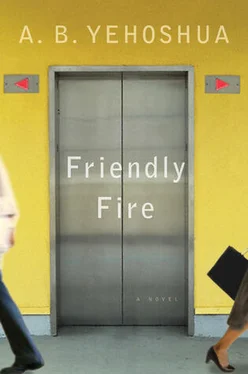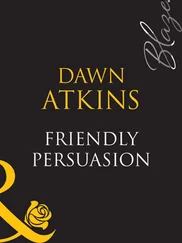"Every word."
"And my request received special attention. Because we're talking here about Israeli gunfire, where even after the official investigation is done there's always some hidden aftergrowth. So one could say that not only did the office move quickly to assist me, they were expecting me."
"What did you want to know?"
"I wanted to check."
"To check what?"
"Why for the soldiers lying in ambush he turned from a hunter into the hunted."
"But they explained it to you. He got the time wrong and came down too early from the roof."
"He did not get the time wrong, Daniela. I've already warned you more than once to drop that idea. Eyali was not a man who got the time wrong. The watch they returned to us, which was on his wrist when he was killed, showed the correct time."
"Maybe he got excited, maybe he was scared."
"No, he was not scared. Your Moran was a cowardly child, but not Eyali. Enough of your maybes, and don't try to teach me what I know better than you do. Just listen."
She reddens. But she can feel his inner torment, and without saying a word she nods, giving her full attention.
"I had never been in Tulkarm, even though the town is half an hour's drive from Netanya. We once dared to go to Hebron, and we visited the Church of the Nativity in Bethlehem. We went to eat at a restaurant in Ramallah, we drove through Jericho, and many years ago we might have also visited Nablus and Jenin. But not Tulkarm. What is there to do in a small border town? Just a town, not terribly neglected, rather clean, with wide streets, avenues, and groves and orchards here and there. And houses of all shapes and sizes. Private homes of one story, or two or even three. Also houses higher than that. And of course a little refugee camp on the side. But not so bad. It's livable. There are surely worse places in the land of Israel.
"And sometimes soldiers are assigned to the rooftops. As a lookout, for an ambush. For one night only, or a few nights. And there are some prominent rooftops, strategic ones, where a whole platoon sits for a month. And under those rooftops live people. Families with children, with loves and hatreds. Not so bad. The world does not collapse. The main thing is to live.
"Remember that our story took place before the second intifada, when the whole thing was a mess, when chaos reigned on both sides. And this officer — he was a successful lawyer who had returned to the army in search of adventure — Eyali's company commander, was altogether on the other side of town that same night, also staking out that notable wanted man, who came to what end I still have no idea. Maybe he's hanging out with the heavenly tribunal, which is what that clown from the security services said, or maybe they gave up looking for him. And this officer, he knows everything, and tools me around Tulkarm as if he were in Ramat-Gan, in a fancy jeep, heavy and armored, with a silent soldier sitting in it with a machine gun. And he shows me the place where Eyali was shot, near a pile of building material, standing by a water faucet, and he points out to me the doorway of the building he rushed out of and explains where the ambush was, and with his two hands he demonstrates the angle from which the bullets were fired, one and then another. I've still got my agenda of identifying the shooter, so I ask him, By the way, if that's where the shots came from, who was the soldier that fired them? And the officer, an intelligent man, winks at me and says, Why do you care? After all, you've gotten to know them all; they're all good guys. Why should we incriminate one of them?
"All right, I say to him, then at least let's go up on the roof. It was five o'clock in the afternoon, and I, Daniela, remember every detail. I climb the stairs, and some of the flights have no banister, and here and there the wall isn't plastered either, and I pass open doorways and nod shalom to entire families, children and adults, old men and women, cooking, sewing, doing homework — whole lives in this building, three actual floors, though not completely finished, but with this wide roof in place at the top, full of laundry hanging to dry, colorful sheets flapping in the wind. And the tenants did not seem surprised that again the Jews wanted to see the world from the Palestinian rooftop, and if they are bringing along an elderly civilian, it must mean something important."
"When was this exactly?"
"In the autumn. Three months after he was killed. The weather was getting cooler. That mute soldier, with the machine gun, was a Druze, and they picked him in particular so he could translate into Arabic who I was and what I wanted. But there was no need for an interpreter, because among the locals there is always someone who knows Hebrew. For example, a pregnant woman, a lovely young lady studying history at Ruppin College, near Netanya. The soldier who was killed, no, she doesn't remember him, but her father will be home soon from the orchard, and he perhaps knows more about the 'work accident.'"
"Work accident?"
"That's the expression we use when they get killed by their own mistakes — for instance, while preparing a bomb — so they pay us back with the same language; why not? Okay, we're now on the roof, and the Druze soldier leans his machine gun on the railing, and the officer describes the sector for me, and I'm walking around from one side to the other; maybe I'll find some clue, some sign of whatever caused Eyal to come down from the roof in a suspicious manner. And evening starts falling with sort of a blue mist, and the pregnant student, who came up after us, asks if she should take down any laundry, and the officer says there's no need, and he points out to the west, where Israeli lights are going on in the coastal plain, so close, close enough to touch."
"You could see the sea from there?"
"Apparently at one time you could, but today, the new tall buildings block the view. That's what the officer told me. And in his opinion, it's a good thing."
"Why good?"
"So they wouldn't desire the sea as well."
"That's what he said? Disgraceful…"
"It was maybe because his patience was running out. The father, who was supposed to arrive any minute from the orchard, never showed up. Someone apparently told him that Jews were waiting for him on the roof of his house, so he preferred to visit some sick uncle and not undergo another interrogation, where he'd have to repeat everything he already told the army, that is, nothing of importance. Does this old story interest you at all?"
"Every word."
He gets up and takes a long look out the window. Then he paces the room for a moment, picks up her novel, has a look inside, and replaces it facedown, the way it was.
"What's it about?"
"Not now. If you want, I'll try to finish it before I go home and I'll leave it for you."
"God forbid… you insist on not understanding. Don't you dare leave behind one letter of Hebrew."
She gives him a piercing look.
"So the father didn't come. And this pregnant student, who spoke Hebrew quite elegantly and gently, saw that we were getting impatient, so she called in her mother, a woman in traditional Arab dress, chubby, knowing not a word of Hebrew, and with a mischievous spirit. The mother did remember the soldier. She didn't see him, but she had heard something from her husband. In the middle of the night, on his own initiative, he brought Eyali some strong coffee, and also a pail, which the soldier had asked him for."
"On his own he brought him coffee?"
"So he would stay awake. That's the way the daughter explained it. And when I asked her, what did your father care if he was asleep, he wasn't protecting you, but the other way around, the mother looked at me with her warm eyes, and even though she knew I was the father of the soldier who was killed, she said to me unabashedly that her husband was afraid that if the Israeli soldier fell asleep, he would have the urge to kill him. But a soldier who was awake would be able to defend himself. So he brought him strong coffee. And the pregnant student translated all this in her delicate accent, while exchanging mischievous smiles with her mother."
Читать дальше












